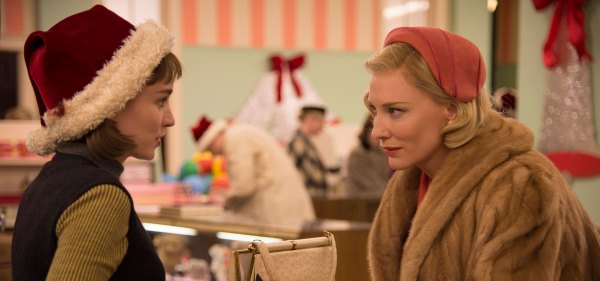Carol is a love story.
Therese (Rooney Mara) is a department store shopgirl in the early 1950s who hasn’t quite come into her own yet. Carol (Cate Blanchett) is charming, composed and wanders about blanketed in melancholy. She’s in the middle of a divorce with a man who wants her back. When the two women’s eyes meet across the room, a love story is set in motion.
Carol, decked out in red lipstick and a thick fur coat, is looking for a Christmas gift for her daughter. She lays down her gloves on the countertop and asks Therese what she dreamed of having when she was four years old. Therese, wearing a Santa hat, with a wall of dolls on display behind her, says she wanted a train set. So Carol orders one for her daughter. After providing her delivery address, Carol departs, leaving behind an enchanted Therese – and her gloves.
Therese, perhaps out of consideration – or driven by some other motivation – leaves the house late one night, boyfriend asleep in her bed, to post the gloves back to Carol. And, so, the two are connected. And Carol takes Therese out for lunch, just to thank her.
The characters are complex and beautifully played. Rooney Mara is both doe-eyed and submissive, while managing to be observant and poised. Cate Blanchett is a wonderful combination of elegance and confidence, mixed with a deep-set discontent. And, ever, behind the eyes of both women, hangs an appeal for love and connection.
Viewers are dragged into the world of the film through its rich detail: Carol’s thick fur coat weighs down on your shoulders; Therese’s drags on lipstick-stained cigarettes burn in your throat; and their magnetic gazes, full of intimacy, are held for a moment too long and make you want to avert your eyes.
The script is pretty close to perfect, with beautifully crafted and powerfully delivered lines. The music complements the indulgent, dreamy style of the cinematography.
The commentary on both homosexuality in the 1950s and the power imbalance between men and women are subtle. Carol’s husband Harge (Kyle Chandler) uses their daughter as leverage to try to control Carol and force her to do what he wants.
Carol isn’t a film about two women daring to fly against convention to have a love affair. It’s a love story between two people who are longing to find their place in the world.
The final scene is a pivotal moment in almost every film – not just to the story but to the viewer, who’s been invested in the characters and seeks a final return. Carol gives this with both hands open, offering a few of the most precious and raw seconds of the whole film – ones that linger after you’ve risen from your seat and stumbled, blinkingly, out into the world.
Carol is up for number of Oscar nominations, including Best Picture, Best Director (Todd Haynes), Best Actress (Cate Blanchett) and Best Supporting Actress (Rooney Mara).
This movie deserves a solid score of 7/10.

